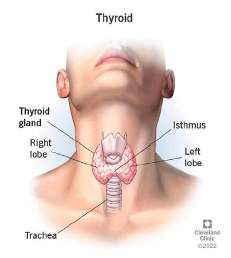Download English PDF, 226KB, PDF
What is Hyperthyroidism?
Hyperthyroidism is a condition in which the thyroid gland produces too much thyroid hormone. When this occurs, the body’s metabolism is abnormally increased, which can cause a variety of symptoms.
What is the Thyroid Gland?
The thyroid is a butterfly-shaped gland in the front of the neck, located below the larynx (voice box) and above the clavicles (collarbones). It produces thyroid hormone, which regulates how the body uses and stores energy.

Causes
- Graves’ Disease
This the most common cause. In Graves’ disease, the immune system produces antibodies that stimulate the thyroid gland to produce excessive thyroid hormone. This usually affects young and middle-aged women but can also occur at any age or gender. The eyes may be affected, with redness, dryness or irritation. In severe cases, there may be double vision and bulging of the eyes.
- Toxic Nodule
One or more thyroid nodules (small non-cancerous growths or lumps in the thyroid gland) can produce too much thyroid hormone.
- Thyroiditis
The thyroid gland may become temporarily inflamed and release excessive thyroid hormone into the bloodstream. This may occur after a viral infection.
- Drug-induced (iatrogenic) hyperthyroidism
Taking too much thyroid hormone supplements (e.g. for treatment of hypothyroidism).
Symptoms
- Anxiety and irritability
- Weakness of the upper arms and thighs
- Hand tremors
- Perspiring and feeling hotter more than usual
- Rapid or irregular heartbeat
- Fatigue
- Weight loss despite a normal or increased appetite
- Frequent bowel movements
- Irregular or cessation of menstrual periods
These symptoms usually resolve with treatment of hyperthyroidism.
Diagnosis
Hyperthyroidism can be diagnosed with blood tests that measure the amount of thyroid hormone (T4) and thyroid-stimulating hormone (TSH). The usual pattern in hyperthyroidism is a high T4 with a very low TSH level.
Treatment
Depending on the cause, hyperthyroidism can be treated using medications, radioactive iodine or surgery. Multiples factors such as age, severity and type of hyperthyroidism are important in deciding the best treatment option.
